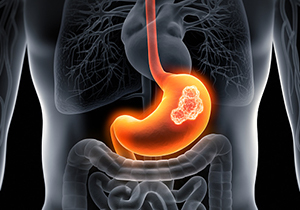In the German VARIANZ study reported in the Journal of Clinical Oncology, Haffner et al found discrepancies between findings in central and local testing of HER2 status in patients with metastatic gastric cancer. In addition, survival outcomes among patients treated with trastuzumab were better among those with HER2-positive status confirmed by central testing.
As stated by the investigators, “Trastuzumab is the only approved targeted drug for first-line treatment of HER2-positive metastatic gastric cancer. However, not all patients respond and most eventually progress. The multicenter VARIANZ study aimed to investigate the background of response and resistance to trastuzumab in metastatic gastric cancer.”
Study Details
The prospective cohort study involved patients treated for metastatic gastric cancer from 35 German sites who were followed for 48 months. HER2 status was assessed centrally by immunohistochemistry and chromogenic in situ, and HER2 gene expression was assessed using quantitative polymerase chain reaction.

Photo credit: Getty
Key Findings
HER2 status was determined both centrally and locally in 339 patients. In most patients, HER2 status was negative both centrally and locally (HER2-negative/HER2-positive). In 77 patients (20.6%), central testing showed HER2-positive metastatic gastric cancer (HER2-positive/HER2-positive). In 83 patients (22.7%), local assessment was not confirmed by central assessment; among these, 74 had HER2-positive results on local testing that was not confirmed by central testing (HER2-negative/HER2-positive) and 9 had HER2-positive results on central testing and negative results on local testing (HER2-positive/HER2-negative).
Among 135 patients receiving trastuzumab with follow-up data, median overall survival was 20.5 months among 60 patients with HER2-positive/HER2-positive tumors vs 10.9 months among 65 with HER2-negative/HER2-positive tumors (hazard ratio [HR] = 0.42, 95% confidence interval = 8.2–14.4, P < .001).
The proportion of tumor cells with HER2 expression was significantly higher among 60 patients with HER2-positive/HER2-positive tumors vs 65 with HER2-negative/HER2-positive tumors (58.6% ± 31.4% vs 12.8% ± 19.6%, P < .001). The HER2/CEP17 amplification ratio was significantly higher among 56 patients with HER2-positive/HER2-positive tumors vs 59 with HER2-negative/HER2-positive tumors (7.2 ± 5.8 vs 1.5 ± 0.9, P < .001).
It was determined that a proportion of ≥ 40% HER2-positive tumor cells in biopsies and resection specimens and a HER2/CEP17 amplification ratio ≥ 3 were optimized thresholds for benefit from trastuzumab. Mean survival was 20.5 months among patients with ≥ 40% HER2-positive cells vs 11.4 months for those with a lower proportion (HR = 0.46, P = .001). Median survival with HER2/CEP7 ratio ≥ 3 vs lower amplification ratio was 22.8 months vs 11.7 months (HR = 0.36, P < .001).
The investigators concluded, “Significant discrepancies in HER2 assessment of metastatic gastric cancer were found in tumor specimens with intermediate HER2 expression. Borderline HER2 positivity and heterogeneity of HER2 expression should be considered as resistance factors for HER2-targeting treatment of metastatic gastric cancer. HER2 thresholds should be reconsidered. Detailed reports with quantification of HER2 expression and amplification levels may improve selection of patients for HER2-directed treatment.”
Florian Lordick, MD, of Leipzig University Medical Center and University Cancer Center Leipzig, is the corresponding author for the Journal of Clinical Oncology article.
Disclosure: The study was supported by the German Federal Ministry for Education and Research. For full disclosures of the study authors, visit ascopubs.org.

